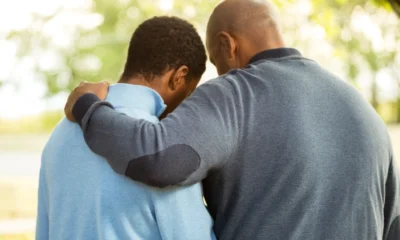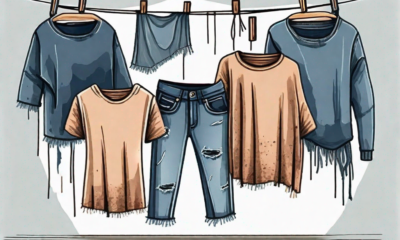1. Your brain chemically reacts to you thinking about someone
It’s not just willpower that keeps you thinking about someone obsessively. Your brain chemistry is partly to blame. A brain chemical called dopamine is the culprit. Dopamine makes you feel pleasure and crave things you desire.
So, every time you think about that person, you get a tiny dopamine reward, making you want to think about them even more. This even happens to people who aren’t in your life anymore.
Losing someone we love triggers the same brain reactions as drugs. Whether it’s a positive or negative fixation, your brain interprets it as a reward or a deprivation, fueling the obsession.
2. You feel regret when you think of how things ended
Stuck replaying a past relationship in your head? The reason might be unresolved feelings. Maybe you regret a breakup or have lingering tension with a friend. Don’t worry, there’s a way to break free.
Accepting you can’t change the past is key. Replaying events to fix them keeps you stuck. Move forward by letting go of regret and focusing on the present. Also, remember that forgiveness and acceptance, even for yourself, can be powerful tools for mental clarity.
3. Humans are social by nature
Our brains are wired for connection, so it’s natural to hold onto memories of past relationships, even if they’ve ended. However, constantly thinking about someone can get in the way of moving on.
Get clear on your future goals: who do you want to be and what do you want from life? When you have a direction, it’s easier to let go of the past and stop dwelling on old connections.
You must know that you’re not alone. Many people struggle with this, but there are strategies you can learn to regain control of your thoughts and focus on what matters most. Follow me as I outline them for you below:
How to stop thinking about someone in 8 easy steps
1. Hit the unfollow button
Craving someone in your head? Hit unfollow! Scrolling through their social media keeps that “feel-good” brain chemical dopamine flowing, making it harder to move on. Seeing them online triggers this cycle, like a mental loop that sets you back.
Be friends with the unfollow button, or even consider a temporary social media break if they pop up often in your feeds. Remember, the goal is to feel better, and sometimes that means taking control of what you see online.
2. Do something that makes you happy
Stop feeding the obsession. Seeing your “fixation” online keeps dopamine levels high, making it harder to move on. Break the cycle with healthy distractions. Laugh with friends, hit the gym, or volunteer with animals—anything to boost your mood and keep your mind present.
Staying mentally active helps too. A busy mind means less space for intrusive thoughts. So go do something fun and engaging, and watch those unwanted thoughts fade away.
3. Play a mindfulness game
Daydreaming about someone, especially a crush, can easily spiral into unproductive thoughts. But fear not! The key is catching yourself when your mind wanders and redirecting it before it goes too far. Like, if you keep thinking about “cute James,” even though he wasn’t so cute when he cheated, acknowledge the thought and gently shift your focus to the present. Use your senses.
What do you see, hear, smell, touch, or taste right now? Grounding yourself in the present breaks the “James loop.” Then, replace those unwanted thoughts with something positive. Plan your weekend, call a friend—anything to shift your mood. Remember, you control your thoughts, not the other way around.
4. Write it out
Can’t stop thinking about someone? Feeling stuck? Write it down! Journaling your thoughts and feelings can clear your head and help you understand yourself better. It can also help you figure out what you really want from relationships.
Here are some prompts to get you started:
- What qualities do I admire in this person?
- What emotions do I feel when I think about them?
- What does this situation say about what I need in a relationship?
- How can I move forward healthily?
Writing down your thoughts and reflections can be a powerful tool for self-discovery and growth. Give it a try and see what insights you uncover.
Get the latest and greatest updates right away! Join our exclusive WhatsApp channel and never miss out on exciting news again.
5. Shift your perspective
Try radical acceptance. It’s about accepting things ended the way they did, even if it wasn’t ideal. Accepting what happened opens doors to learning and growth. It’s not about dwelling on “what went wrong,” which just keeps you stuck. Instead, use this as a chance to learn from your experience and move forward positively. Remember, acceptance doesn’t mean condoning what happened; it means letting go and focusing on your future.
6. Meet new people
Don’t blame yourself for a relationship that didn’t work out. Feeling good about yourself is key, and meeting new people can help boost your confidence and shift your focus. Plus, connecting with others keeps you present, preventing overthinking about the past. So be kind to yourself, explore new connections, and focus on the awesome person you are.
7. Be kind to yourself, okay?
Don’t worry if unwanted thoughts pop up even after trying everything. Getting frustrated just adds fuel to the fire. Instead, be kind to yourself. Remember, it’s normal to have lingering thoughts sometimes.
Focus on self-compassion—do things that make you feel good and loved. That could be anything from relaxing hobbies to spending time with supportive people. Taking care of yourself is key to moving forward healthily.
8. Talk to a therapist or coach
Feeling stuck despite the tips? Consider seeking professional help. Talking to friends and family is great, but a therapist offers an unbiased perspective and specific tools to help you navigate your emotions. They can guide you through this challenging time and help you move forward healthily. Don’t hesitate to reach out for support; you’re not alone.
It’s normal to have lingering thoughts, especially if things ended badly, but blaming yourself just adds to the stress. Know that compatibility plays a big role in relationships, and sometimes it just doesn’t work out.
Another common question you may ask yourself is, “Will I ever get over them?” The key is asking yourself if you even WANT to get over them. How is holding onto them serving you? You know there are countless other people out there. To truly move on, figure out what drew you to that person—connection, intimacy, or something else? Once you understand your needs, you can start looking for those good qualities in others and open yourself up to new possibilities.
So, be kind to yourself, accept what was, and focus on finding someone who truly fits your needs. There’s someone out there for everyone, and focusing on your own happiness is the first step to finding them!
If you like this article, read more here.






























































